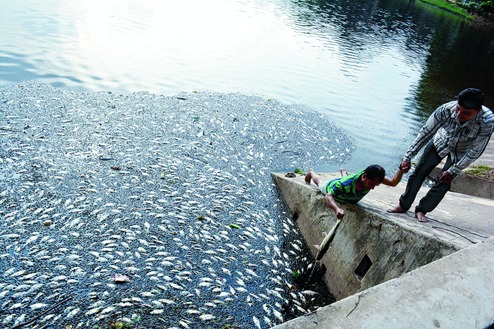
Jayanti Sarovar - Jamshedpur's landmark lake - is slowly and steadily turning into an eternal grave for aquatic life.
Scores of fish gasped for air early on Wednesday as greasy industrial effluents streamed into the lake, cutting oxygen supply, the incident coming close on the heels of the suicidal swim of shoals two days ago in the wake of rising temperatures and shrinking water depth.
This is not the first time an oily layer has covered the Sarovar surface. In 2014, the lake had turned into a mass grave twice, in May and November, after which civic utilities firm Jusco had claimed to have installed soak pits at inlet channels. The results are still not showing.
The greasy water surface was noticed by morning anglers, but before they could raise an alarm, hundreds of rohu, catla, catfish, tilapia and mrigal carp began floating up dead along the banks. Anxious members of Jamshedpur Angling Club stirred the water intermittently in vain hope of driving away shoals to the middle of the lake, where survival chances were better.
Morning-walkers lunged from railings to watch the helpless struggle for life. "It is a pity that so many fish are dying. The authorities must do something (to save them)," said Sujit Jha, a local resident.
Of course, there was prompt action. A team of Jusco workers in a makeshift boat shoved the dead fish towards the bank where a second team collected them for mass burial inside Jubilee Park.
Eyewitnesses told this newspaper that toxic effluents were coming into the lake from the inlet near Old Court premises in Sakchi. The streaming, they said, began on Tuesday evening.
Jayanti Sarovar has two inlet channels - one near Old Court and the other near Tata zoo. The Old Court area is address for big industries like Tata Steel and Praxair India Private Limited, a manufacturer of industrial gases. Also, the area hosts a clutch of motor garages, many of which are unauthorised and have questionable practice of effluent discharge.

Angling club members squarely blamed local industries for the pollution.
"The lake is already shallow and the oily layer on the water surface is depleting the dissolved oxygen level," said secretary Bidyut Bhowmick. "It seems chemical effluents from nearby industries and garages are responsible for the mess. If something is not done immediately, more fish will die," added senior member Nasim Khan.
Conservationist K.K. Sharma warned that industrial effluents could wipe out species from the Sarovar. "The greasy layer on water breaks contact with oxygen and fish have difficulty breathing. Their gills get coated with oil, causing suffocation and subsequently, death," he said.
Sharma, a representative of Ornithological Society of India (Bihar-Jharkhand), said the lake was once again showing classic symptoms of high turbidity, biological oxygen demand, chemical oxygen demand and presence of suspended and dissolved organic matter.
"In short, Jayanti Sarovar is crying out for help. Action should be taken against industrial units operating in the vicinity," he added.
Tata Steel subsidiary Jusco, the guardian of the lake, oddly claimed there was "no pollution" and held rising temperature responsible for the greasy grave. "We shouldn't always be blamed. We have already installed fountains and soak pits close to both inlets so that effluents do not flow directly into the lake," said spokesperson Rajesh Rajan.
When confronted with picture proof, Rajan claimed this was a one-off incident. "You cannot say the lake is polluted all the time. Sakchi is a commercial hub with several motor garages. It is possible that polluted water from there has streamed into the lake. We will conduct an investigation."











